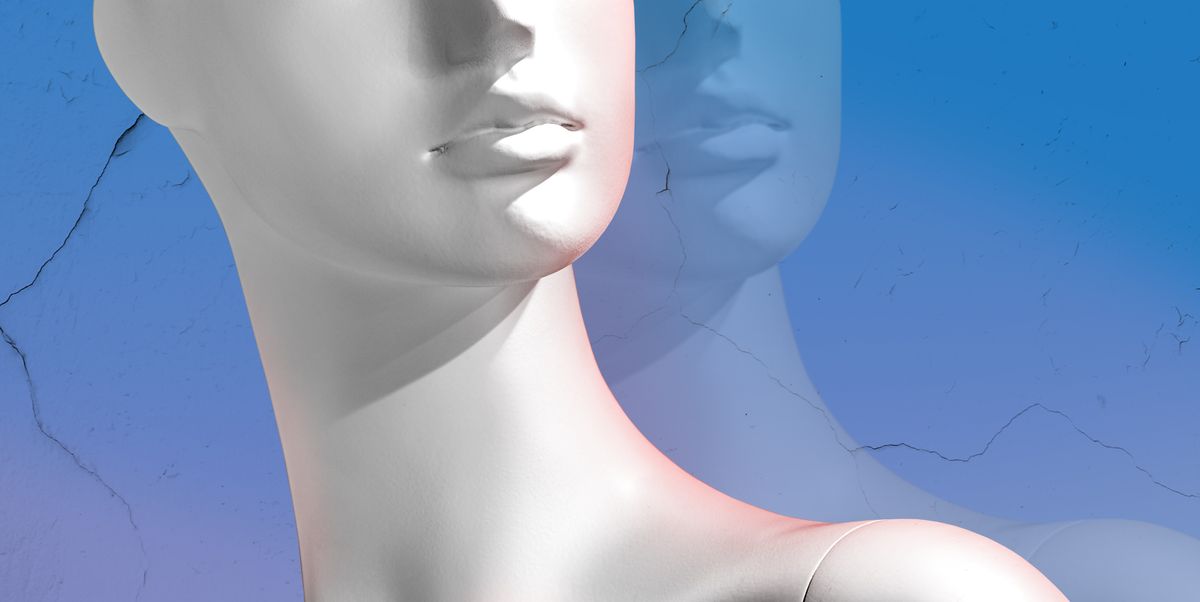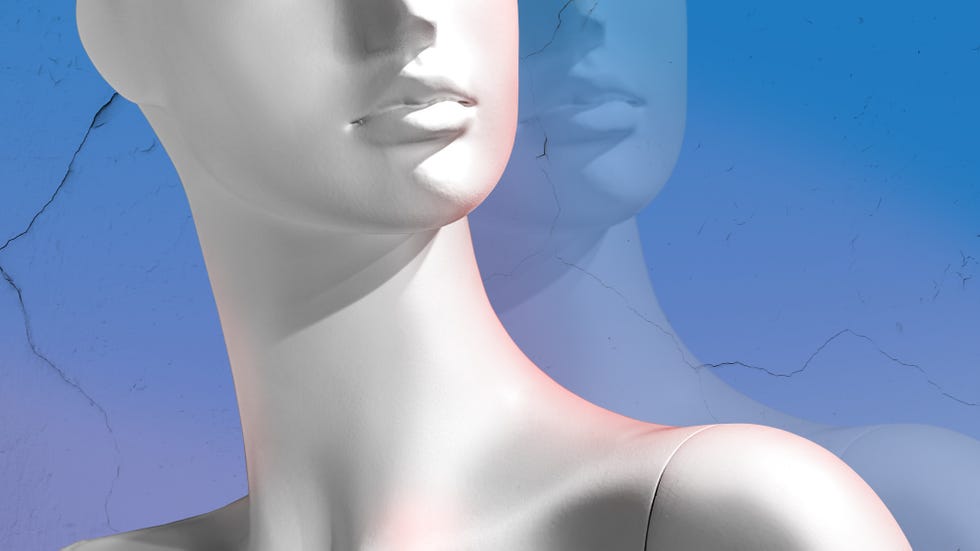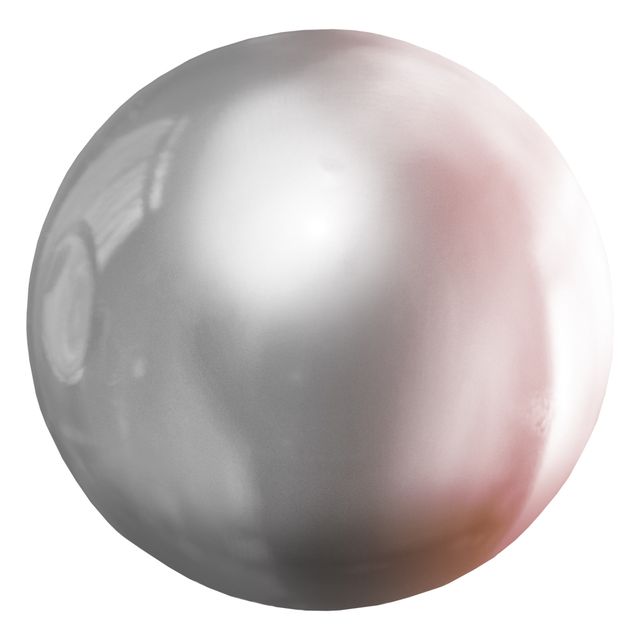If an alien beamed down to earth and had relied solely on social media influencers to build its understanding of human biology, it would be forgiven for thinking we were close relatives of dolphins, and covered in nothing but smooth, poreless skin. In fact, it’d be forgiven for thinking we were made from something closer in texture to plastic, rather than flesh. Because, despite the fact we now take more pictures of ourselves than ever before, the way we represent our skin online is wildly inaccurate.
It’s visible in the images that celebrities like Kim Kardashian and Jennifer Lopez—who are in their 40s and 50s, respectively—post online, revealing skin so smooth it could be glass. It’s visible in the beauty filters that are available through apps like Snapchat and TikTok, which turn the texture of our largest organ into liquid. Sometimes it’s even done without us realizing: companies like Samsung and Apple have built technology into our phones which automatically make our skin appear silken and strangely smooth in selfies, transforming our complexions to the point where they resemble waxed apples or laminate flooring.
To make matters worse, it’s not just celebrities and tech companies fueling the proliferation of dolphin skin across the internet. These sorts of images are produced by your yoga teacher, your mother’s friends, everyone you went to high school with, and the person who grooms your dog—and they all live in your phone, in perfect poreless condition, accessible 24-hours-a-day on social media. The chasm between what we see on the internet—a virtual space which the average American inhabits for almost two hours daily—and what we see when we look in the mirror is, increasingly, enormous.
All this uncanny smoothness is having an undeniable impact on the real world. Skin care concepts like “glass skin”—a Korean beauty trend designed to make pores and texture vanish—have attracted billions of views on TikTok. Sales of collagen, a protein thought to keep skin looking youthful and smooth, are booming. Startups that give people remote access to personalized, prescription-level skin care products are attracting millions of dollars in investments. The number of laser skin resurfacing procedures, according to the American Society of Plastic Surgeons, increased by 484 percent between 2000 and 2020.
But while our wallets point towards increased interest—if not obsession—with matching our IRL skin to what we see on social media, our behavior online all but confirms it. On Reddit’s skin care communities, like r/SkincareAddiction, which is nearly two million members strong, 22-year-old women are asking for help fighting fine lines that are simply part of a normal human face. Requests for help to fix “enlarged pores” are almost endless; the constant stream of people obsessing over perfectly healthy skin has resulted in desperate pleas for members to remember what their skin is actually supposed to look like. “I am begging the moderators of this sub to start a new sub or just please do something to save this sub,” one distressed user lamented earlier this year. “It’s no longer the r/SkincareAddiction sub. It’s the ‘what’s wrong with my face?’ sub.”
It’s something that’s raised alarm amongst the community’s veteran members. “We had a real problem where users were asking what was wrong with their skin or asking how to fix things like perfectly normal nasolabial folds—and they were submitting pictures of their normal skin,” says Maya Adivi, a 31-year-old digital nomad and r/SkincareAddiction moderator originally from Canada. The subreddit has had to implement rules in order to prevent such posts from piling up, although many still seep through the cracks. “It’s hard to deal with it. People are looking for perfect skin.”
Adivi is one of many concerned spectators from online skin care communities who have noticed an alarming trend: more and more women are obsessing over non-existent problems with what appears to be perfectly healthy skin. It raises questions about the impact of social media—and photo editing—on our attitude towards pores, fine lines, and other perfectly normal parts of our anatomy, which could be damaging our mental health.
The aforementioned elements of textured skin have always had a sordid history with human beings. Experiments to deal with pores and the problems they cause—like acne and uneven complexions—began after their discovery in the mid-1700s. Before that, women could be found slathering everything from raw slivers of meat to toxic mercury on their skin in order to combat blemishes and signs of aging. The mid-20th century came with slightly less terrifying treatments, like laxatives and antibiotics for acne, and chemical peels for anti-aging conducted under the supervision of plastic surgeons. But once the 2000s hit—shortly after Bioré came out with the first-ever pore strips to suck the life out of our noses—skin perfection, fueled by consumer choices, was the goal. Excessive skin care routines and flawless skin as a status symbol had been popularized in everything from mainstream magazines to pop-culture characters, like American Psycho’s Patrick Bateman and Mean Girls’ Regina George (“My pores are huge!”)
James Swerzenski, an assistant professor at the University of Mary Washington in Virginia who focuses on media literacy, says that while the early 2000s were instrumental in shaping how we perceive our skin—largely because of the rise of technology like Photoshop, which was used by photographers to perfect the images people saw in mass media—it’s important to recognize such phenomena in context. “I think often these conversations can get an ‘okay, Boomer’ tone. There are so many incidents throughout history of people in dark rooms, messing with photos and changing and altering them,” he says. What has changed, however, is the ability of consumers to perfect themselves through built-in filters on their phones, or apps like Facetune, which launched in 2014 and allows users to drastically transform their faces in seconds. “I think that’s the tantalizing thing. Before, I didn’t know what my face would look like if I had a team of photo editors to fix it [like a celebrity does],” added Swerzenski. “Now, I can do it in 20 seconds.”
Perhaps it’s unsurprising, then, that the proliferation of self-edited photos, created by average people and often distributed through social media websites like Instagram, has in turn impacted the way we see ourselves, often for the worse. “You’re looking at Instagram or any social media, and you’re like, ‘these people are perfect—how do I get to that?’ It can really mess with your head, when you spend so much time online, and you’re only comparing yourself to blurred, airbrushed goddesses,” says Ruby, who is 22 years old and works as a restaurant hostess in Chicago. (Ruby asked ELLE.com to withhold her last name for privacy.) She has admittedly struggled with a range of skin problems, like acne across her forehead and psoriasis on her face, since she was a teenager, and felt that social media warped her perspective when it came to her skin. “I was brainwashed into thinking that I was the one person who was going through this. It shouldn’t be something that we’re conditioned to hate.”
According to seasoned members of the skin care world—who frequent online communities dedicated to skin perfection, like Reddit’s r/SkincareAddiction—the main problem is the prevalence of edited images, even in places where you wouldn’t normally expect them, without any acknowledgement that they’ve been altered. “There’s a good chance that an image I’m looking at is edited, but we’re just used to taking it at face value, especially if it’s coming from regular people,” says Corina Malamas, a 45-year-old medical coder from New York City. “It’s sometimes subtle enough that you don’t realize how unrealistic it is.”
Malamas tells ELLE.com that she usually finds edited pictures being circulated in posts that don’t have anything to do with skin at all—like online curly hair communities, or in images shared by fitness influencers. Despite her awareness that the editing is happening, she still struggles with comparisons between herself and people with edited pictures. “I get really irrationally jealous when I see people getting into skin care much younger, because I’m like, ‘If I had started when I was 18, I’d be in a much different place at this point,’” noted Malamas, who has had lines on her forehead since her mid-twenties. “I’m better about obsessing over my pores these days than I was before—but at one point, I had to throw away every magnifying mirror I own.”
Others feel pressure through self-comparison, as they strive to make sure that their skin matches the images they post of themselves online. “It’s a pride thing for me—I don’t want people to think I look different to my Instagram. If anything, I’ve invested much more money in skin care and makeup than I ever have in the past [because of social media],” says Natalie Ward, a 27-year-old content moderator from Nashville, Tennessee. It doesn’t help that social media now offers a constant source of selfies and old images for comparison. “I can get back on Facebook and find photos of myself from when I was in 10th grade. I don’t look the same. It’s very easy for you to look back at this photo from 2015 and be like: ‘Wow, she looks so good. I wish I looked like that.’”
While Ward agreed that social media was a huge force in her obsession with skin care, she noted that the niche also offered community and a respite. “So many things are just completely out of my control. I can’t turn to state legislators, or local police, or anybody that you’re supposed to, for a lot of issues,” Ward says. “So, what am I going to do? I’m going to hyper-focus on myself. And I do feel like something about that is very empowering.”
Skin care, of course, is not the only route to accepting your skin’s texture for what it is. That’s something Ruby, who runs the Instagram account @problematicfame, where she examines celebrity pictures for the telltale signs of plastic surgery, worked out while analyzing photographs. “I began to see all of these unedited photos—I was like, ‘Oh! Literally everybody has a little spot here or there,’ you know?” she says. “I just put a post out there to be like, ‘Hey, this is what celebrities actually look like.’” The account has 300,000 followers and counting.
Ruby’s findings inspired one of @problematicfame’s most popular series, in which she shares unedited celebrity photographs to prove that everyone has skin texture—good and bad. “These people are insanely gorgeous, but even with the best skin care, the best dermatologist, and the best treatment, they’re still going to have spots and bumps and texture,” she says. She’s been spurred on by heartfelt comments from her followers, who have told her they find the posts comforting. “That really made me happy to think about,” she continues. “I’m actually doing something that’s changing the way people see themselves for the better.”
She’s not the only person taking a stand against these sorts of things. Moderators of r/SkincareAddiction actively work to remove posts in which they think someone’s aims are “unrealistic,” often opting to send direct messages in which they gently explain the poster’s problem might not be their skin; they also delete the posts in question to prevent the community from inadvertently spreading unrealistic expectations. “I don’t think it’s okay to tell someone their skin is normal,” says Adivi, who works with other moderators to remove cruel, rude, or sarcastic comments when such posts slip through the cracks. (They also work to “set the tone” for responses to skin concerns by leaving their own empathetic responses.) “We try to cultivate a kind community,” she adds, “especially when we think someone is very distressed about what they’re dealing with.”
Swerzenski is hopeful that over time, people will start freeing themselves from unachievable standards. It’s something he’s already started to see with his younger students, who are unphased by the idea that their images on social media don’t resemble their real-life selves. “These filters will continue, but the expectation that we have to actually look like them in real life isn’t going to be there. Almost like an avatar online, where you’re recreating yourself through these particular tools,” Swerzenski says. “I think maybe it’s best for humanity that we just detach from the bizarre, idealized version of ourselves we post online. Then we can just kind of exist in our regular lives, looking like schlubs.”
Ward, meanwhile, thinks that our attitude to skin texture may change as a direct result of the technology that is currently causing us to reject it. Increasingly, AI is being used to generate everything from professional headshots to artistic portraits, all of which have been created without a real person ever being involved. “I think there’s going to be people who start moving away from it, who do want to show their pores and skin texture,” says Ward. “They’re going to want to use it to prove that they’re a real person.”
It’s an approach to skin that Ruby is willing to get behind. “People are so afraid to have any sort of texture, but there’s nothing wrong with it,” she says. “It shows that you’ve lived life and you’ve had experiences—why try to erase that? It’s real—and I think reality can be a really beautiful thing.”
Freelance Writer
Jessica Lucas is a London-based internet culture reporter who covers niche online communities, rising internet subcultures and fandoms, as well as scandals, scams, and issues impacting the world of “very online” people. Her work has been published in BuzzFeed News, Cosmopolitan, Rolling Stone, The Atlantic, The Verge, Input magazine, Business Insider, i-D, and The Information, among others.




